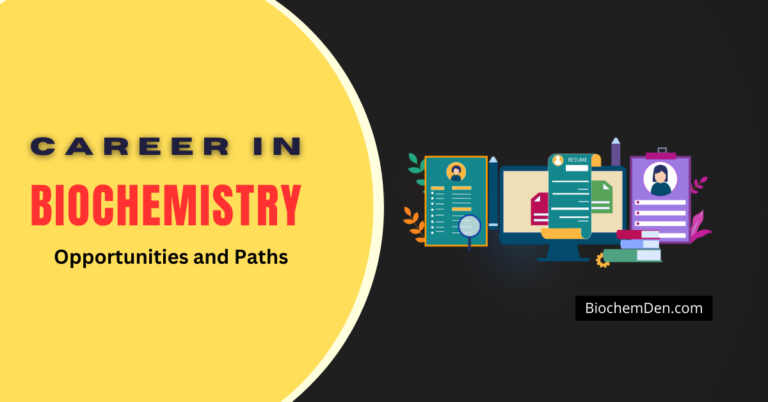There are numerous articles available on career advice in biochemistry, biotechnology, and other branches of the life sciences, and we do not intend to duplicate them. Undoubtedly, dedicated students and researchers can achieve significant growth in this field.
However, the challenge lies in figuring out how Indian students can excel in this field. Unfortunately, there isn’t much information available online about how to frame your career advice or what your next steps should be. That’s why we’ve decided to provide career advice on planning in life sciences or biotechnology, specifically for Indian students.

If you have just completed your higher secondary education in the life sciences stream, you might be wondering what are the different career options that are available for you. The field of life sciences offers a wide range of opportunities for students who are interested in biology, chemistry, and other related fields. In this article, we will discuss some of the career advice for students who have completed their +2 in life sciences.
Understanding Life Sciences
Before we dive into career advice, let’s first understand what the life sciences are all about. Life sciences is a branch of science that deals with the study of living organisms, their structure, function, and behavior. It includes fields like biology, biochemistry, genetics, biotechnology, microbiology, and more.
Career Paths in Life Sciences
There are several career paths that you can choose in the life sciences after completing your higher secondary education. Here are some of the most popular career paths that you can consider:
a. Medical Science
If you are interested in pursuing a career in medicine, you can opt for courses like MBBS, BDS, BAMS, BHMS, and more. These courses will enable you to become a doctor, dentist, or practitioner of Ayurveda or Homeopathy.
b. Biotechnology
Biotechnology is a rapidly growing field that offers several career opportunities. You can choose to pursue courses like a BSc in Biotechnology, a BTech in Biotechnology, an MSc in Biotechnology, and more. These courses will enable you to work in fields like genetic engineering, drug development, and more.
c. Microbiology
Microbiology is the study of microorganisms and their interactions with other living organisms. If you are interested in pursuing a career in microbiology, you can opt for courses like a BSc in Microbiology, an MSc in Microbiology, and more. You can work in fields like pharmaceuticals, the food and beverage industry, and more.
d. Environmental Science
Environmental science is the study of the natural environment and its relationship with human beings. If you are interested in pursuing a career in environmental science, you can opt for courses like a BSc in Environmental Science, an MSc in Environmental Science, and more. You can work in fields like environmental monitoring, conservation, and more.
e. Forensic Science
Forensic science is the application of scientific methods to solve crimes. If you are interested in pursuing a career in forensic science, you can opt for courses like a BSc in Forensic Science, an MSc in Forensic Science, and more. You can work in fields like forensic labs, police departments, and more.
Skills Required for a Career in Life Sciences
To excel in the field of life sciences, you need to have a specific set of skills that will help you perform well and contribute to the scientific community. Here are some of the essential skills that are required for a career in the life sciences:
a. Analytical Skills
Analytical skills are critical in the field of life sciences. As a life scientist, you will be dealing with a vast amount of data, and you need to be able to analyze and interpret it accurately. You will also be required to identify patterns, relationships, and trends in the data. Having strong analytical skills will enable you to draw valid conclusions from the data and make informed decisions.
b. Communication Skills
Communication skills are essential in any field, and the field of life sciences is no exception. As a life scientist, you will be required to communicate your findings, ideas, and research to a wide range of audiences, including your peers, researchers from other fields, and the general public. Having strong communication skills will enable you to articulate your thoughts and ideas clearly and effectively, making it easier for others to understand your research and its significance.
c. Problem-Solving Skills
Problem-solving skills are crucial in the field of life sciences. Life scientists are constantly faced with complex problems that require innovative solutions. Having strong problem-solving skills will enable you to identify the root cause of a problem, come up with creative solutions, and implement them effectively. Problem-solving skills will also help you to approach challenges with a positive attitude and a willingness to learn, making you more adaptable to changes in the field.
d. Technical Skills
Technical skills are essential in the field of life sciences. As a life scientist, you will be required to use a wide range of scientific tools and techniques to conduct experiments, analyze data, and draw conclusions. Having strong technical skills will enable you to operate and maintain equipment effectively, ensuring that your experiments are accurate and precise. Technical skills will also help you learn new techniques quickly, making you more versatile in the laboratory.
So having a specific set of skills is essential for pursuing a successful career in the life sciences. Analytical skills, communication skills, problem-solving skills, and technical skills are some of the most important skills required for a career in the life sciences. Developing and improving these skills will help you become a successful life scientist, make significant contributions to the scientific community, and advance the field of life sciences.
Tips for Choosing a Career in Life Sciences
Choosing a career in the life sciences can be a challenging and daunting task, but with the right approach, it can also be an exciting and rewarding experience. Here are some tips that will help you choose a career in the life sciences:
a. Research
Before choosing a career in the life sciences, it is essential to do thorough research. Look into the different career options available in the field and the education and training requirements for each one. This will help you gain a better understanding of the different career paths available and choose the one that aligns with your interests and career goals. Consider factors such as job growth, salary, work-life balance, and opportunities for career advancement.
b. Talk to Professionals
One of the best ways to gain insight into a career in the life sciences is to talk to professionals working in the field. Reach out to professionals who are working in the field that you are interested in and ask them about their career path, daily tasks, and any challenges they face. This will help you gain a better understanding of what it takes to succeed in the field and provide you with valuable insights into the industry.
c. Internships
Internships are an excellent way to gain hands-on experience in the field and build your network. Look for internships that align with your career interests and goals, and apply for them. Internships will provide you with an opportunity to work on real-world projects, develop your skills, and learn from experienced professionals. Additionally, internships can often lead to job offers, providing you with a stepping stone to kickstart your career in the life sciences.
So choosing a career in the life sciences can be a challenging decision, but with the right approach, it can also be an exciting and rewarding experience. Conducting thorough research, talking to professionals, and taking up internships are some of the best ways to gain insights into the different career options available in life sciences and choose the one that aligns with your interests and goals. By following these tips, you can set yourself on a path toward a successful career in the life sciences.
Frequently Answered Questions (FAQs)
What is the eligibility for pursuing a career in the life sciences after +2?
To pursue a career in the life sciences after +2, you need to have completed your higher secondary education in the science stream with a focus on biology, chemistry, and other related subjects.
What are the different career options available in the field of life sciences?
Some of the popular career options in the life sciences include medicine, biotechnology, microbiology, environmental science, and forensic science.
What are the essential skills required for a career in the life sciences?
Some of the essential skills required for a career in the life sciences include analytical skills, communication skills, problem-solving skills, and technical skills.
What are some tips for choosing a career in the life sciences?
Some tips for choosing a career in the life sciences include researching the different career options available, talking to professionals in the field, and taking up internships to gain hands-on experience.
What are some of the challenges faced in pursuing a career in the life sciences?
Some of the challenges faced in pursuing a career in the life sciences include staying updated with the latest developments in the field, handling complex data and experiments, and facing tough competition.
Conclusion
Life sciences is a field that offers several career opportunities for students who have completed their +2 in this stream. From medicine to biotechnology, environmental science to forensic science, there are many paths that you can choose from. It is essential to do research and talk to professionals in the field to make informed decisions. Additionally, having the right set of skills is crucial to excelling in the field of life sciences.
Discover more from Biochemistry Den
Subscribe to get the latest posts sent to your email.



